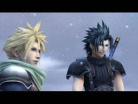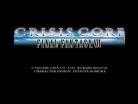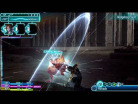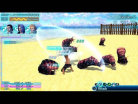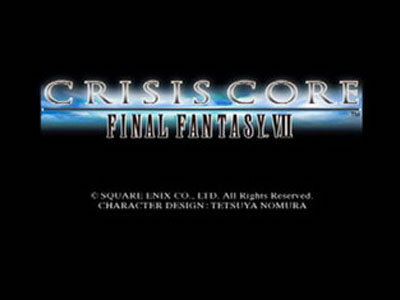- CLASSIC MAGAZINES
- REVIEW CREW
A show recapping what critics thought back
when classic games first came out! - NEXT GENERATION'S BEST & WORST
From the worst 1-star reviews to the best
5-stars can offer, this is Next Generation! - NINTENDO POWER (ARCHIVE)
Experience a variety of shows looking at the
often baffling history of Nintendo Power! - MAGAZINE RETROSPECTIVE
We're looking at the absolutely true history of
some of the most iconic game magazines ever! - SUPER PLAY'S TOP 600
The longest and most ambitious Super NES
countdown on the internet! - THEY SAID WHAT?
Debunking predictions and gossip found
in classic video game magazines! - NEXT GENERATION UNCOVERED
Cyril is back in this spin-off series, featuring the
cover critic review the art of Next Generation! - HARDCORE GAMER MAGAZING (PDF ISSUES)
Download all 36 issues of Hardcore Gamer
Magazine and relive the fun in PDF form!
- REVIEW CREW
- ELECTRONIC GAMING MONTHLY
- ELECTRONIC GAMING MONTHLY RANKS
From Mario to Sonic to Street Fighter, EGM
ranks classic game franchises and consoles! - ELECTRONIC GAMING MONTHLY BEST & WORST
Counting down EGM’s best and worst reviews
going year by year, from 1989 – 2009! - ELECTRONIC GAMING BEST & WORST AWARDS
11-part video series chronicling the ups and
downs of EGM’s Best & Worst Awards!
- ELECTRONIC GAMING MONTHLY RANKS
- GAME HISTORY
- GAME OVER: STORY BREAKDOWNS
Long-running series breaking down game
stories and analyzing their endings! - A BRIEF HISTORY OF GAMING w/ [NAME HERE]
Real history presented in a fun and pithy
format from a variety of game historians! - THE BLACK SHEEP
A series looking back at the black sheep
entries in popular game franchises! - INSTANT EXPERT
Everything you could possibly want to know
about a wide variety of gaming topics! - FREEZE FRAME
When something familiar happens in the games
industry, we're there to take a picture! - I'VE GOT YOUR NUMBER
Learn real video game history through a series
of number-themed episodes, starting at zero! - GREAT MOMENTS IN BAD ACTING
A joyous celebration of some of gaming's
absolute worst voice acting!
- GAME OVER: STORY BREAKDOWNS
- POPULAR SHOWS
- DG NEWS w/ LORNE RISELEY
Newsman Lorne Riseley hosts a regular
series looking at the hottest gaming news! - REVIEW REWIND
Cyril replays a game he reviewed 10+ years
ago to see if he got it right or wrong! - ON-RUNNING FEUDS
Defunct Games' longest-running show, with
editorials, observations and other fun oddities! - DEFUNCT GAMES QUIZ (ARCHIVE)
From online quizzes to game shows, we're
putting your video game knowledge to the test!- QUIZ: ONLINE PASS
Take a weekly quiz to see how well you know
the news and current gaming events! - QUIZ: KNOW THE GAME
One-on-one quiz show where contestants
find out if they actually know classic games! - QUIZ: THE LEADERBOARD
Can you guess the game based on the classic
review? Find out with The Leaderboard!
- QUIZ: ONLINE PASS
- DEFUNCT GAMES VS.
Cyril and the Defunct Games staff isn't afraid
to choose their favorite games and more! - CYRIL READS WORLDS OF POWER
Defunct Games recreates classic game
novelizations through the audio book format!
- DG NEWS w/ LORNE RISELEY
- COMEDY
- GAME EXPECTANCY
How long will your favorite hero live? We crunch
the numbers in this series about dying! - VIDEO GAME ADVICE
Famous game characters answer real personal
advice questions with a humorous slant! - FAKE GAMES: GUERILLA SCRAPBOOK
A long-running series about fake games and
the people who love them (covers included)! - WORST GAME EVER
A contest that attempts to create the worst
video game ever made, complete with covers! - LEVEL 1 STORIES
Literature based on the first stages of some
of your favorite classic video games! - THE COVER CRITIC
One of Defunct Games' earliest shows, Cover
Critic digs up some of the worst box art ever! - COMMERCIAL BREAK
Take a trip through some of the best and
worst video game advertisements of all time! - COMIC BOOK MODS
You've never seen comics like this before.
A curious mix of rewritten video game comics!
- GAME EXPECTANCY
- SERIES ARCHIVE
- NINTENDO SWITCH ONLINE ARCHIVE
A regularly-updated list of every Nintendo
Switch Online release, plus links to review! - PLAYSTATION PLUS CLASSIC ARCHIVE
A comprehensive list of every PlayStation
Plus classic release, including links! - RETRO-BIT PUBLISHING ARCHIVE
A regularly-updated list of every Retro-Bit
game released! - REVIEW MARATHONS w/ ADAM WALLACE
Join critic Adam Wallace as he takes us on a
classic review marathon with different themes!- DEFUNCT GAMES GOLF CLUB
Adam Wallace takes to the links to slice his way
through 72 classic golf game reviews! - 007 IN PIXELS
Adam Wallace takes on the world's greatest spy
as he reviews 15 weeks of James Bond games! - A SALUTE TO VAMPIRES
Adam Wallace is sinking his teeth into a series
covering Castlevania, BloodRayne and more! - CAPCOM'S CURSE
Adam Wallace is celebrating 13 days of Halloween
with a line-up of Capcom's scariest games! - THE FALL OF SUPERMAN
Adam Wallace is a man of steel for playing
some of the absolute worst Superman games! - THE 31 GAMES OF HALLOWEEN
Adam Wallace spends every day of October afraid
as he reviews some of the scariest games ever! - 12 WEEKS OF STAR TREK
Adam Wallace boldly goes where no critic has
gone before in this Star Trek marathon!
- DEFUNCT GAMES GOLF CLUB
- DAYS OF CHRISTMAS (ARCHIVE)
Annual holiday series with themed-episodes
that date all the way back to 2001!- 2015: 30 Ridiculous Retro Rumors
- 2014: 29 Magazines of Christmas
- 2013: 29 Questionable Power-Ups of Christmas
- 2012: 34 Theme Songs of Christmas
- 2011: 32 Game Endings of Christmas
- 2010: 31 Bonus Levels of Christmas
- 2009: 30 Genres of Christmas
- 2008: 29 Controls of Christmas
- 2007: 34 Cliches of Christmas
- 2006: 33 Consoles of Christmas
- 2005: 32 Articles of Christmas
- 2004: 31 Websites of Christmas
- 2003: 29 Issues of Christmas
- 2002: 28 Years of Christmas
- 2001: 33 Days of Christmas
- NINTENDO SWITCH ONLINE ARCHIVE
- REVIEW ARCHIVE
- FULL ARCHIVE
Crisis Core: Final Fantasy VII
Crisis Core: Final Fantasy VII is a stunning accomplishment from Square Enix. This new PSP action/adventure game is so good that you'll completely forget about the other horrible Final Fantasy VII spin-offs (including, but not limited to, Dirge of Cerberus and Advent Children). This game is so good that it makes up for the lack of original PSP software from Square Enix. It's so good that ... well, it's so good that you'll have a hard time going back to God of War: Chains of Olympus. And at the end of the day isn't that the biggest compliment of them all?
Crisis Core is the long-awaited prequel to Final Fantasy VII. You play Zack, a character who made a small, but important, role in Square's seminal 1997 PlayStation role-playing game. Given Zack's brief cameo in Final Fantasy VII, it may seem a little strange to see him headlining his own game. Believe it or not, Zack is integral to Cloud's classic adventure and his story manages to flesh out an already epic story.
The game begins with a young Zack pining to become a SOLDIER 1st Class, an elite group of fighters that appear to be genetically enhanced. Along the way he'll meet up with a number of famous characters from Final Fantasy VII (Cloud, Tifa, etc.), become one of the greatest soldiers in Midgar and, most importantly, uncover the truth about a secret project that was trying to genetically engineer the perfect warrior (in other words, it's the story of Alien Resurrection).
But Final Fantasy VII fans will get something more out of this experience. If you're one of those people who cried when Aerith died ten years ago or are still confused at exactly what happens at the end of disc three, then Crisis Core is for you. In this thirty hour adventure you'll learn a number of crazy things that will make you reevaluate everything you thought you knew about the original Final Fantasy VII. What will you find out, you may ask? Well, learn all about Sephiroth before he became a girl killing jerk. Learn about Cloud's man-crush on our hero, Zack. Learn why Yuffie will stop at nothing to steal your hard-earned treasure. Learn why Aerith would be the sweetest, yet most boring girlfriend ever.
Yes, this is the kind of game that is nothing but fan service, which will probably leave a lot of non-Final Fantasy VII fans scratching their heads. The good news is that Crisis Core manages to weave a tale that works on its own. So while some gamers may not understand the significance of Cloud, Tifa and the rest of the famous Final Fantasy VII characters, they won't think about it for long because they'll be too wrapped up in the game's exciting story. I definitely like that this works as its own stand-alone story, in truth the game is meant to be played by those of us who remember Final Fantasy VII back in the late 1990s. That's the target audience, so if you haven't played the original game then what are you waiting for? By now every serious fan of role-playing games should have made it through at least the first disc of Square's 1997 epic.
Without a doubt the biggest bone of contention for a lot of people is the brand new combat system. In a lot of ways Crisis Core does not feel like a traditional Final Fantasy game; the actions aren't turn based, you never control more than one person and it happens so fast that it might as well be in real time. It's a radical departure for Square Enix; the game really feels more like a cross between Kingdom Hearts and Parasite Eve. Regardless of how different it is, this brand new combat system works surprisingly well on the hand held and makes this game feel a lot different from its console brothers.
When you enter a combat situation your heads-up display will change and you will control a small row of icons at the bottom of the screen. You attack with the "X" button; however all you are doing is ordering your character to perform a move. By pushing the left and right shoulder buttons you can switch between commands for Zack, including conjuring up magic, using items and kicking butt. You can also use the "triangle" button to block attacks and the "square" button to roll out of the way.
For the first hour or two it feels like Crisis Core is nothing more than "Push X: The Game." It felt like a lot of the battles could be won by simply mashing the "X" button and focusing your attention on something else (like the Charles in Charge marathon you could be watching). But slowly the game adds more depth, including ways to customize your character in a number of intriguing ways. Crisis Core goes from being a button masher to having one of the most exciting control schemes I've seen in years. It's a lot deeper than you'll give it credit for in the beginning, yet so simple that after thirty hours you won't feel like you're just wading through boring menus.
The truth of the matter is that the controls just work, to the point where you will be able to take on huge enemies that should be way outside of your experience level with relative ease. That's not to say that the game is easy, but once you've mastered the controls and menu you'll start to discover just how exciting these battles can be. That doesn't mean that taking on the low level enemies will be any more entertaining, but you're going to have a blast dodging the boss attacks with this easy to use control scheme.
Along with this strange new control scheme is something called the DMW, the Digital Mind Wave. This slot machine-style leveling up system is not only bizarre (and maybe a little out of place in a role-playing game), but also bound to rub a few Final Fantasy purists the wrong way. It's out there, that's for sure. Ignore the silly name; the DMW is nothing more than a traditional slot machine. But this is no ordinary slot machine, it has pictures of characters found in the game (Sephiroth, Cloud, Aerith, etc.) and allows you to pull of special moves (and maybe a few summons, if you're lucky enough).
As a gamer you have no control over the DMW machine, it just sits at the top left of your screen spinning independently from your battle. For the most part you can completely ignore it, however, once the DMW has made two matches your battle will be interrupted by a larger version of the wheel and the chance to connect three characters in a row (and thus pull off that person's special move). But wait, there's more. If you match two or more numbers you will also upgrade you various magic spells and special attacks. And if you are able to connect three 7's in a row your character, Zack, will level up. It's that simple.
Okay, I'll admit, all that sounds kind of confusing. And the fact that you don't gain experience, but rather level up through what seems to be a random pull of the slot machine sounds bad. But I assure you, all of this quickly comes together and it ultimately makes the whole thing a lot more enjoyable. In fact, because you never know when you're going to level up, I actually found myself really excited about getting into random battles. When was the last time you could admit to being happy about random encounters?
Regardless of whether you like these changes or not, Crisis Core proves that Square Enix isn't afraid to take chances when making their games. Of course, one could certainly argue that a lot of those chances haven't paid off for them (Dirge of Cerberus springs to mind), but from time to time they strike gold and come up with something that is original, functional and a lot of fun to play with. And that's the combat in Crisis Core, it takes the Final Fantasy gameplay in a whole new direction ... and I like it.
Along with a lengthy quest, Crisis Core features dozens of optional missions that are completely separate from the main story. The brilliance of these missions is that you can only do them at save points, so they are always accessible and ready to go. Best of all, if you only have a few minutes to spend playing Crisis Core, all you need to do is turn the system on and go into a mission, you never have to hunt around for them or spend time going through needless dialog. These missions are quick (often no more than three to five minutes) and full of cool loot (extra spells, new summons, etc.). They are the perfect time waster; it's just one mindless mission after another.
As I was preparing this review I started to think back at my time in the wonderful/horrible world of Midgar. While it's easy to pick apart some of the minor gripes (why can't we skip cinemas?), the truth is that there's a lot to love about the approach Square Enix took with this release. It's not the big things that impress (though, the changes to the combat system are both bizarre and impressive all at the same time), it's all of the small touches that make this feel like the polished product that it is. It's the small things, like the complete lack of backtracking you do in the title. If the story wants you to return to some place across the world map it will instantly teleport you there, you rarely have to spend time running through familiar locales.
I also love how quick and easy it is to do everything, from customizing your character to buying brand new items. In this game you don't have to worry about finding a town with an item shop, you can just buy your potions and magic spells from just about anywhere in the world. This, like the lack of backtracking and availability of option missions, makes Crisis Core feel like the perfect portable adventure game. The game is always accessible and always fun, even if you're stuck on a tough boss.
But maybe we shouldn't gloss over the negatives so quickly. The game does have a few minor problems that should have been addressed before shipping. The biggest gripe has to be the fact that you can't skip lengthy cinema scenes. At first this isn't a problem (since the cinemas are generally pretty interesting), but there are a few points where you'll go against a tough boss only to lose and then have to watch the whole cinema all over again. Seeing the same cinema three or four times in a row is no fun, especially when some of them are so long and over the top. Thankfully I only had to deal with that a few times, but it's annoying that you can pause a cinema but not skip it.
Another small gripe is the amount of random encounters. While it's true that Crisis Core has made random battles fun again, it's also true that you can have too much of a good thing. This game is loaded with random encounters, often at the worst possible times. There are some dungeons that will have one random battle after another, sometimes with no more than one or two seconds between them. Thankfully this problem doesn't happen frequently, but it would have been nice if the developers could have toned down the amount of random battles a little.
The game itself is not quite as long as its console siblings. You'll notice that this game does not come on three UMDs, so you should probably expect a much shorter experience than other recent Final Fantasy games. The game itself (including the extra missions and whatnot) will run you around 30 hours. That's not bad, especially for a portable game, but if we were talking about Final Fantasy XII then 30 hours would have been the halfway mark. Fortunately the length works to the game's benefit. Seeing as you're only playing one character 30 hours seems about right; this game definitely does not overstay its welcome.
As good as the story, gameplay and cinemas are, the real reason to play Crisis Core is for the graphics. Now that I'm so used to playing all of my "next-generation" games in high def it's sometimes difficult to be impressed by a portable game playing on a small screen. But Crisis Core's visuals will blow you away. From beginning to end the game is absolutely gorgeous, each area (the dungeons, cities, snowcapped mountains, etc.) has an amount of detail that you just don't see very often in a portable game. And it's not just the backgrounds, the enemies you fight against are very cool ... especially the bosses. And let's not forget the summon spells, a Final Fantasy staple that has always wowed graphics-hungry gamers. Although there are only a few creatures to summon, their cinemas (which, unlike all other cinemas, you can skip) are on par with anything I've seen on the PlayStation 2.
But it's not just the level of detail that is so impressive; it's also WHERE you are. Let's not forget that it's been 11 years since we've visited a mako reactor in Midgar. The last time we saw these locations they were small, overhead and 32-bit. But all that has changed, and we can see what Final Fantasy VII would look like had it been remade for the PlayStation 2. All this is done on purpose; there are so many areas that are meant to remind you of something you saw a decade ago. Heck, even the game's introduction is a throwback to the beginning of Final Fantasy VII, complete with the music and train barreling towards the city.
Speaking of music, Crisis Core's audio is on par with its visuals. Like all great Final Fantasy games, this PSP title features a nice collection of songs. It's not unusual to go from a sweeping song with a beautiful melody to butt rock. The soundtrack is diverse and exciting, featuring a number of remixed versions of familiar Final Fantasy VII songs. The voice acting is also good, though not nearly to the same level of Metal Gear Solid Portable Ops or God of War: Chains of Olympus. Then again, part of the problem may be the somewhat clunky localized script, which is good, but still a little wooden.
Crisis Core: Final Fantasy VII is the Square Enix role-playing game that people have been clamoring for ever since the release of the PSP. This is a phenomenal achievement, both in terms of graphics, gameplay and story. Although it's shorter than previous Final Fantasy outings, Crisis Core's story is no less interesting and intense. In fact, I would argue that the story here is one of the most interesting I have seen in a long time. Its roots are still very much in the Japanese RPG genre, but it's not afraid to try new things. Crisis Core is a must buy for anybody that owns a PSP, it's that simple.
HOME |
CONTACT |
NOW HIRING |
WHAT IS DEFUNCT GAMES? |
NINTENDO SWITCH ONLINE |
RETRO-BIT PUBLISHING
Retro-Bit |
Switch Planet |
The Halcyon Show |
Same Name, Different Game |
Dragnix |
Press the Buttons
Game Zone Online | Hardcore Gamer | The Dreamcast Junkyard | Video Game Blogger
Dr Strife | Games For Lunch | Mondo Cool Cast | Boxed Pixels | Sega CD Universe | Gaming Trend
Game Zone Online | Hardcore Gamer | The Dreamcast Junkyard | Video Game Blogger
Dr Strife | Games For Lunch | Mondo Cool Cast | Boxed Pixels | Sega CD Universe | Gaming Trend
Copyright © 2001-2025 Defunct Games
All rights reserved. All trademarks are properties of their respective owners.
All rights reserved. All trademarks are properties of their respective owners.






